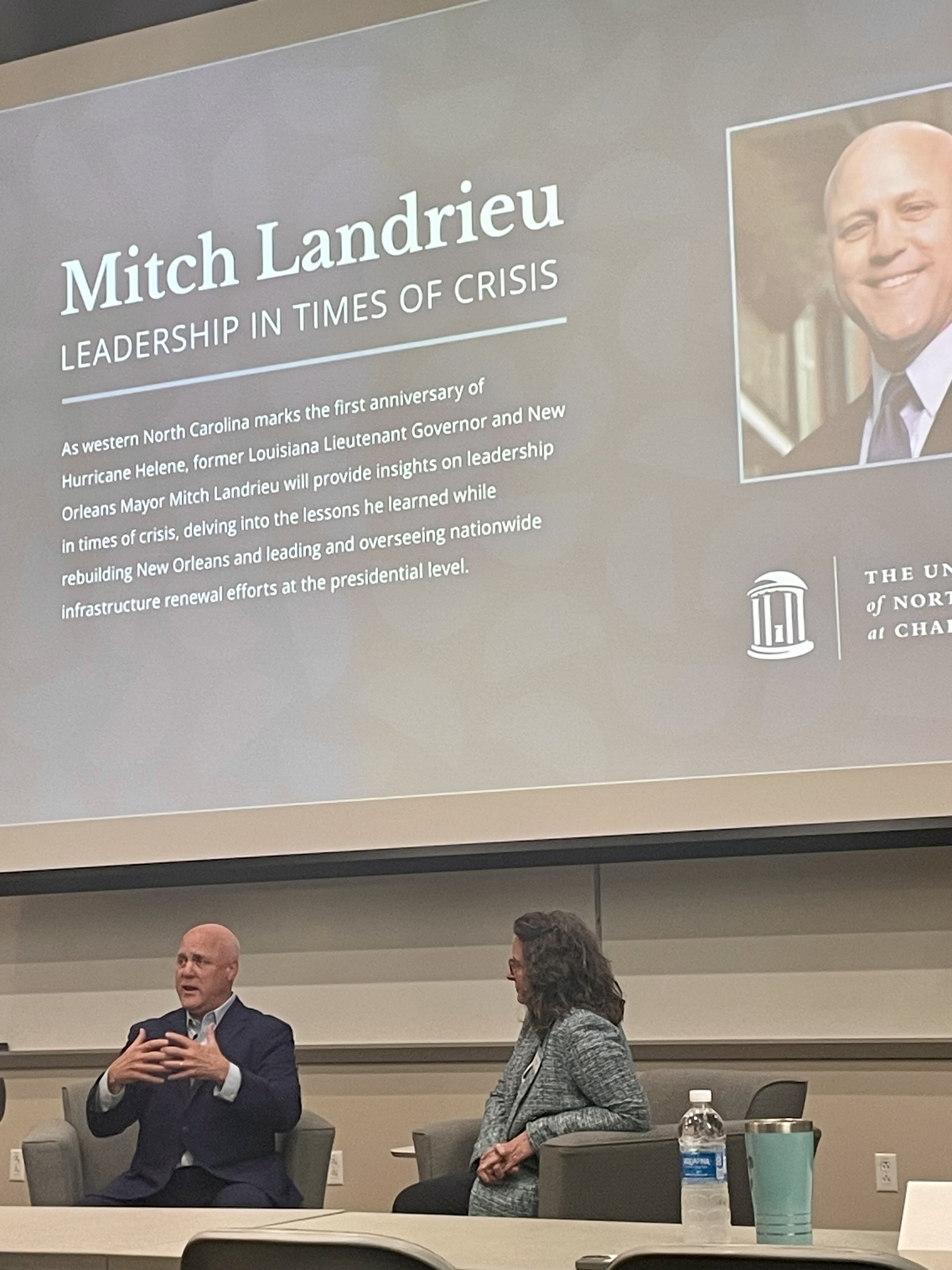Former New Orleans Mayor Mitch Landrieu delivers lecture on leadership in times of crisis
As North Carolina marked the first anniversary of Hurricane Helene making landfall in the western region of the state, former New Orleans Mayor Mitch Landrieu visited the School of Government to share a few words on leadership in times of crisis. The event, hosted on October 1, 2025, in connection with the Office of UNC-Chapel Hill Chancellor Lee Roberts, was free and open to the public.
During his talk, Landrieu delved into lessons he learned following Hurricane Katrina, which struck New Orleans in August 2005 while Landrieu was serving as Louisiana’s lieutenant governor (2004 to 2010). He described perilous and shocking rescues in the days after the storm, the everyday heroics of city residents coming to the aid of others, and leadership lessons he witnessed and stored for use later in his life and career.
“It is always true that in the darkest moment, angels among us come out of nowhere. And these are not people with titles. These are not the mayors and the governors and fire chiefs and the heads of the library board or the heads of the civic association. . .And in that moment, you really see this amazing humanity that comes out of us. And that's the thing that gives you the faith and the hope that no matter how bad it gets—and nobody would wish that it would be bad—but no matter how bad it gets, we're going to find our way out because we're in the same boat.”
Much of Landrieu’s mayorship, which he assumed in 2010 and departed in 2018, involved using the operational levers of city government to aid in the years-long recovery from the natural disaster. He cited pragmatic coalition-building and inclusive faith-based policymaking as essential to his—and the city’s—ultimate success in recovering from the disaster.
After serving as mayor, he led nationwide infrastructure renewal efforts at the presidential level. He served as senior advisor and infrastructure implementation coordinator in the Joseph Biden administration from 2021 until 2024. From this experience, he said he learned that public officials—whether in Louisiana, North Carolina, or elsewhere—can follow a basic mission when trying to rebuild systems, infrastructure, and capacity following a heavy loss.
“There are some essential truths that run through government,” he said. “It is really easy to tear stuff down. It’s really hard to build a building back. You need a good carpenter.”
Landrieu told the audience about visiting the affected regions of North Carolina following Helene’s destruction in early October 2024. He spoke of how government has a duty to lead the recovery efforts, but he also emphasized how grassroots efforts to respond to disasters must and will always come organically from the community members served by the government.
Landrieu shared a bit about his philosophy and collaborative, inclusive approach to governing. He cautioned that while partisan debates can challenge consensus and community-building in the face of crises, there is still a record to show that these disputes are not without precedent or hope for resolution.
“We're having a moment. We are having a historical moment. For young people who don't get this, this is not a normal moment. There have been four or five of these since the beginning of our country, but we are in a moment, and we have to get out of it. We have the capacity to do it because we have everything we need to fix our problems.”
Closing his lecture, Landrieu imparted some of the wisdom he learned from his decades of government service: to build institutions and a sense of good will back is hard, but more than worth it.
“So remember this,” he went on. “Building it back better and making it run so that people in the future can really benefit from it. That's a lot harder. It takes a lot more responsibility. It takes a lot more thought to make sure that it's there by the time you leave. That takes real vision.”
For governments on the front lines of recovery efforts, Landrieu also delivered a message: act with intention, urgency, and strong resolution to serve your constituents.
“Try to find the courage to do the right thing,” Landrieu said. “Stop waiting for someone to come and fix the problems for you. You don’t ask for permission; you ask for forgiveness.”
Published October 9, 2025



